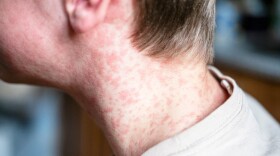Fla. Gov. Ron DeSantis said the Lee County Electric Cooperative is moving too slowly restoring power to its customers in the hardest-hit communities in Southwest Florida after Hurricane Ian and needs to ask for more help in terms of mutual assistance.
The governor said the LCEC needs to accept help from mutual aid groups in hard-hit areas like Cape Coral, North Fort Myers, Sanibel, and Pine Island. National agencies, such as the Florida Electrical Cooperatives Association, on Sunday morning said it remained ready with resources from its members around the state willing to come in and help.
DeSantis’ reaction came after a briefing at the State Emergency Operations Center in Tallahassee on the efforts to restore power in Southwest Florida.
DeSantis learned the FP&L said more than 45% of their accounts in Lee County were back on, but the LCEC reported restored power just to 9% of their customers, which represents about 18,000 out of 183,000.
It was unclear Sunday morning if the LCEC had called out to the exchange or anyone else for help. A pair of spokeswomen for the LCEC contacted Sunday morning for comment did not immediately respond.
The nonprofit electric cooperative, which purchases its electricity from FP&L, counts zero customers with power in Cape Coral, Pine Island, and in some of Lee County and parts of Collier, Hendry, Charlotte, and Broward counties.
Whether recovering from a hurricane, fighting a wildfire, planning for a big concert, or clearing the way for a Fourth of July parade, mutual aid is often the way for one department to help another.
A LCEC press release Sunday said as soon as the storm passed, LCEC had 1,000 boots on the ground to restore power.
"Daily progress is being made in the areas where customers are able to receive power, including Cape Coral, North Fort Myers, Immokalee, Everglades City, Lehigh Acres, and Marco Island," the release said. "LCEC has restored power to more than 50% of customers in Marco Island, Immokalee, and Lehigh Acres. Work continues to restore the main circuits that serve customers in Cape Coral, North Fort Myers, Everglades City and other pockets within the service territory."
The power company added that all but three of the 23 LCEC substations were energized (Friday) and crews were to begin to do work to restore main circuits.
The National Association of Regulatory Utility Commissioners says mutual assistance refers to voluntary partnerships among utilities in the same region, where utilities can get help from one other when in need. The partnerships save small utilities from having to keep large numbers of emergency crews on staff all the time
“In the worst and most widespread outages, one company may not have the skilled people, trucks, equipment, experts, and data to get lights back on all by itself,” the association wrote. “Utilities address these resource constraints by using “mutual aid” or “mutual assistance” programs that allow companies to pool resources to meet their shared needs during emergency events.”
Florida and more than a dozen other states belong to the Southeastern Electric Exchange, a group of utilities that have agreements to offer mutual aid assistance when a request is made.
On Saturday the LCEC asked its customers for patience.
“They may not see trucks on their street, but crews are working in the area and will continue to work until all power is restored to those able to receive it.”
Environmental reporting for WGCU is funded in part by VoLo Foundation, a non-profit with a mission to accelerate change and global impact by supporting science-based climate solutions, enhancing education, and improving health.
Sign up for WGCU's monthly environmental newsletter, the Green Flash, today.
WGCU is your trusted source for news and information in Southwest Florida. We are a nonprofit public service, and your support is more critical than ever. Keep public media strong and donate now. Thank you.





